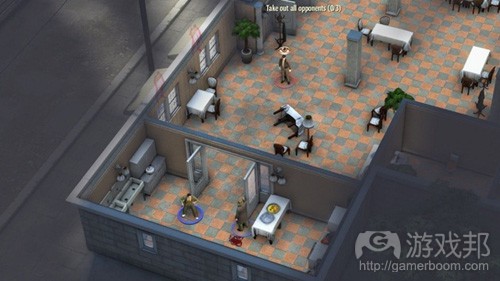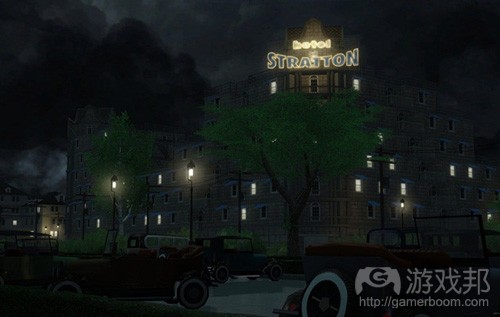Bisser Dyankov谈游戏如何兼容深度与易用性
作者:Mike Rose
作为城市管理系列《海岛大亨》的忠实粉丝,我十分好奇其开发商Haemimont Games会以上世纪20年代黑手党为背景制作游戏。
在《黑手党:黑帮之城》中,你将扮演一个刚出道的黑帮头目,你努力拉拢势力,召集邻近家庭,维护自己的犯罪帝国。
在体验几个小时后(游戏邦注:该游戏如今只推出Windows PC版本,2月5日将登陆Xbox 360平台),我明显感到Haemimont的这款作品在努力迎合各类玩家。
《黑手党》是《海岛大亨》风格的城市管理游戏,你会派遣手下到城市周围的酒吧与毒品窝点,目的是制造动乱,提高现金流动率。同时,该作还包含回合制战略元素,其效果极其类似最近《XCOM》的翻版(玩家们深深沉迷于该作)。
Haemimont Games兼《黑手党》设计师Bisser Dyankov表示,结合两种完全不同的玩法元素是个棘手事件。
他解释道:“从基本原则出发,我们不会从‘深度与易用性’中做出选择。它们属于两种不同玩法,但它们并不是同根绳索上的两端。”
Dyankov相信,将深度与易用性视为独立元素是关键,但牺牲任意一个部分则是种愚蠢行为。
他补充道:“我们多次修改《黑手党》的战略部分。直到最后才取得令人满意的体验深度。比如更改经济运作方式,引入独立交易模式等。然而,我们相信各个设计中的易用性基本相同。”
Dyankov坦言,然而,归根到底,玩法深度通常比易用性更加重要。他解释道:“战略游戏应以深度为核心。”
但Haemimont是如何解决易用性问题的?哪些战略游戏元素有助于吸引那些对该类题材不熟悉的玩家?
Dyankov答复道:“答案是采用缓慢上升的学习/难度曲线。我们在先前作品(游戏邦注:即《海岛大亨》系列)制作中也有相似经历。总会有个时刻,设计团队中有人抱怨游戏难度偏低,挑战过于简单,游戏几乎丧失趣味性。”
他补充道:“游戏逐渐缺乏娱乐元素,更像是固定模式的体验。玩家知道如何行动,他只需执行一些强制动作。”
Dyankov表示该时刻通常发生在游戏开发一年左右的时候,那时的游戏基本成型,已可向家人与好友展示。玩家在游戏进程中必然会遇到困难期,而这对设计团队而言是种警醒。
他指道:“这类事件通常能够促进‘优化内容呈现方式’。如果他们继续表示该作难度过大,我们便会意识到自己的错误,并调整学习/难度曲线。”
在难以操作的战争中,该工作室允许玩家跳过大部分回合制战斗,如果他们这样做,该作基本上会转变为城市管理模式。其中必须体验的部分都是推进故事情节发展的内容。
Dyankov解释道:“我们知道有些玩家喜爱城市建造游戏。可能以该模式为核心能够迎合他们,而且也不会限制那些打算体验战斗模式的玩家。其实,这并不是‘输赢’决策。”
对于上面提到效仿Firaxis的《XCOM》,Dyankov表示两者之间的对比是不可避免的,虽然他解释道在推出《X-Com》时,《黑手党》已进入开发阶段。
他补充道:“我们相信,《XCOM》的发行具有极大优势,因为它有助于复兴回合制战役理念。我们希望该类题材拥有更多发展空间,尤其是我们应努力将它们引入到主机游戏市场。”
他继续表示:“重新创建题材对开发者与玩家都有益,而且有助于整个行业发展。总之,随着移动平台、独立游戏与Kickstarter的出现,电子游戏市场会发生翻天覆地的变化。”(本文为游戏邦/gamerboom.com编译,拒绝任何不保留版权的转载,如需转载请联系:游戏邦)
Depth and accessibility can be friends, says Tropico dev
by Mike Rose
As a huge fan of the Tropico city-management series, I was hugely intrigued to hear that developer Haemimont Games was trying its hand at the 1920s mafia setting.
Omerta: City of Gangsters puts you in the role of an up-and-coming mob boss, as you attempt to rustle up support, take out the neighboring families, and secure your own crime empire.
After several hours with the game, which is due for release today for Windows PC and February 5 for Xbox 360, it’s clear to me that Haemimont is attempting to cater for a wide range of players with the title.
There’s the Tropico-styled city management, which sees you sending your soldiers out to pubs and drug dens around the city, in a bid to cause some trouble and raise your cash flow. Then there’s the turn-based strategy element, which will feel very familiar to those people who have just managed to shake their addiction with the recent XCOM remake.
Bisser Dyankov, game designer on Omerta at Haemimont Games, says that when it comes to combining the two completely different gameplay elements, it can be a tricky road.
“As a ground rule, we do not go into the direction of the choice between ‘depth or accessibility,’ he explains. “They are two different aspects of the gameplay, but they are not the opposite ends of the same line.”
Treating depth and accessibility as individual elements is the key, believes Dyankov, and attempting to sacrifice part of one for the other is a fool’s game.
“We did a complete redesign of the strategic part of Omerta – not once, but several times,” he adds. “Only at the end we were content with the depth of the experience. We changed the way the economy worked, introduced independent businesses, etc. However, we believed that accessibility was more or less the same in each of the designs.”
However, admits Dyankov, when it comes down to it, depth usually outweighs accessibility at Haemimont. “Strategic games are like that,” he notes. “Depth is part of their heart.”
But how does the studio tackle accessibility? What strategy game elements can really help pull those gamers in who perhaps aren’t so familiar with the genre?
“A slowly rising learning/difficulty curve,” answers the designer. “We’ve had similar experiences with our previous titles (the Tropico series). We always reach a moment when someone from the design team — often yours truly — starts complaining that the difficulty is too low, the challenges are too easy and the fun element is nearly eliminated.”
“The game becomes less about entertainment and a more work-like experience,” he adds. “The player knows what to do and he only has to make a number of obligatory actions.”
Dyankov says that this moment usually happens around a year into development, when the game has gotten to a point where it can be shown to friends and family. These people inevitably have a hard time progressing through the game, sending warning signs to the team.
“Such events usually facilitate the ‘polish the presentation’ part,” he says. “If those guys keep finding the game too difficult, we know we’re perhaps overdoing it and we can adjust the learning/difficulty curve.”
One method that the studio has implemented in its war on inaccessibility is allowing players to skip the majority of the turn-based battling if they so choose, essentially turning the title into more of a city-management experience. The only segments that are mandatory play are those which contribute to the storyline.
“We know that there are players who enjoy our city-building games,” notes Dyankov. “Introducing the possibility to focus on the city-building is a nod to our fans, and does not limit the experience of the players who want to get their hands as dirty as possible. It is not a ‘win-or-lose’ decision, actually.”
As for the aforementioned XCOM remake from Firaxis, Dyankov is fully aware that a comparison between the two games will be unavoidable, although he notes that X-Com was announced when Omerta development was already well underway.
“We definitely think that the release of XCOM is an advantage because it helps revive the turn-based combat idea,” he adds. “We hope there is room for more than two games with emphasis on turn-based combat, especially with the efforts to bring those titles to the console market.”
He continues, “Re-establishing a genre is something that is good not only for us as developers, it is good for the players, and it may help the industry as a whole. The whole video games market is reinventing itself, with the advent of the mobile platforms, indie games and Kickstarter.” (source:gamasutra)
下一篇:列举定义RPG游戏的9大分类标准









































 闽公网安备35020302001549号
闽公网安备35020302001549号